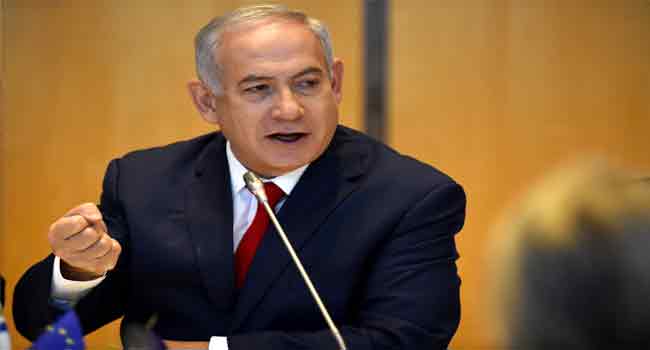
Prime Minister Benjamin Netanyahu held talks with lawmakers from the minority Druze community on Thursday after a court challenge over a deeply controversial law declaring Israel the nation-state of the Jewish people.
Opponents have called the law “racist” as it makes no mention of equality and Israel’s democratic character, implying the country’s Jewish nature takes precedence.
It speaks of Israel as the historic homeland of the Jews and says they have a “unique” right to self-determination there.
Members of Israel’s 130,000-strong Druze community — who serve in the police and military — have been among those strongly denouncing the legislation.
Community leaders have filed a court challenge to the law, given final passage in the middle of the night on July 19. It becomes part of Israel’s so-called basic laws, a de facto constitution.
Two key ministers have called for changes to the law in response to concerns from the Druze.
Netanyahu held a meeting with Druze lawmakers on the issue, along with Finance Minister Moshe Kahlon, Defence Minister Avigdor Lieberman, Tourism Minister Yariv Levin and Communications Minister Ayoob Kara.
Kara, a member of Netanyahu’s right-wing Likud, is Druze but voted in favour of the law. He has since reportedly received death threats.
Netanyahu planned another meeting on Friday with Druze community leaders and a plan would later be developed to express Israel’s “profound commitment” to the Druze, the prime minister’s office said.
Kahlon called for changes, saying the law had been “passed in haste”.
“The last thing that we want is to harm the Druze community,” Kahlon, whose Kulanu party is the second-largest in Netanyahu’s coalition, told army radio.
‘Heal the rift’
His comments followed similar ones on Wednesday by Education Minister Naftali Bennett of the religious nationalist Jewish Home party.
Bennett, who was a prominent advocate for the law, said he had now realised damage was done, adding that the Druze were “our brothers who stand shoulder to shoulder with us on the battlefield”.
“We, the government of Israel, have a responsibility to find a way to heal the rift,” he said.
The law has sparked international criticism of Israel and intense controversy at home.
A freelance cartoonist for a local magazine who drew Netanyahu and other politicians as pigs alongside a reference to George Orwell’s “Animal Farm” after the passing of the law has become a subject of criticism.
The Jerusalem Report magazine decided to stop publishing Avi Katz’s cartoons “after a number of them in recent months sparked angry reactions”, a statement from the magazine’s owner, The Jerusalem Post Group, said Thursday.
“A cartoon showing Israeli leaders with pigs’ heads causes harm and incitement, and has no place in any of our publications,” it said.
Some said the cartoon contained anti-Semitic images even though it was a clear reference to Orwell’s book, with the quote: “All animals are equal, but some are more equal than others.”
Press freedom advocates criticised the magazine’s move to let him go.
The controversy over the new law is set to continue in the coming days, with Druze leaders planning a demonstration against the law in central Tel Aviv on August 4.
The Druze are an offshoot of Shiite Islam. Officials say there are 110,000 of them in northern Israel and another 20,000 in the Israeli-occupied Golan Heights.
The legislation makes Hebrew the country’s national language and defines the establishment of Jewish communities as being in the national interest.
Arabic, previously considered an official language, was granted only special status.
Arab Israelis have also denounced the law, saying it encourages discrimination and racism.
Arab citizens make up some 17.5 per cent of Israel’s more than eight million population.
The Palestinian leadership has lashed out at the passage of the law.
Palestine Liberation Organisation secretary-general Saeb Erekat told journalists Thursday that “this law was introduced to constitute the basis of cancelling the concept of a two-state solution and to officially replace it with one state, two systems — apartheid.”
AFP
